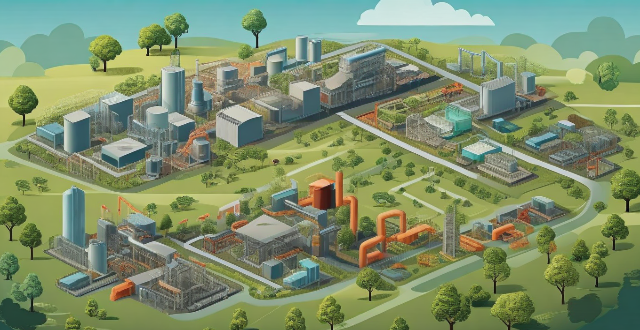Social Responsibility

How does corporate social responsibility impact employee satisfaction and retention ?
Corporate Social Responsibility (CSR) is a business model that focuses on balancing profitability with social responsibility. It involves companies taking actions to improve societal well-being, environmental sustainability, and ethical practices. This approach not only benefits the community and the environment but also has a significant impact on employee satisfaction and retention. The relationship between CSR and employee satisfaction includes enhanced company image and reputation, alignment with personal values, and improved work environment. The relationship between CSR and employee retention includes lower turnover rates, increased loyalty, and higher engagement levels. In conclusion, corporate social responsibility plays a crucial role in enhancing employee satisfaction and retention. By prioritizing CSR initiatives, companies can create a positive work environment, attract and retain talent, and foster loyalty among their employees. As a result, businesses that embrace CSR are more likely to have a stable workforce and achieve long-term success.

Why is corporate social responsibility important for businesses ?
In full: Why Corporate Social Responsibility is Important for Businesses Corporate social responsibility (CSR) is crucial for businesses as it helps manage reputation, mitigate risks, foster innovation and competitive advantage, and attract and retain top talent. Companies that engage in socially responsible practices are seen as trustworthy, ethical, and caring by consumers, investors, and employees. This positive image can lead to increased customer loyalty, higher employee retention rates, and better access to capital. By adopting sustainable practices, companies can reduce their exposure to regulatory fines, lawsuits, and reputational damage resulting from environmental or social misconduct. CSR also encourages innovation and competitive advantage by promoting creativity and collaboration within organizations. Today's job seekers are increasingly looking for employers who share their values and demonstrate a commitment to making a positive impact on society and the environment. By embracing CSR, companies can attract and retain employees who are passionate about making a difference in the world. As consumers become more aware of the impact of business on society and the environment, companies that prioritize CSR will be well-positioned to succeed in the long run.

How do ESG standards affect corporate responsibility ?
ESG standards shape corporate responsibility by providing a framework for measuring and managing company impact on the environment, society, and governance. They require companies to reduce their carbon footprint, ensure sustainable sourcing, promote diversity and inclusion, engage with communities, maintain ethical business practices, and encourage board diversity. Adhering to these standards demonstrates commitment to sustainability and social responsibility, leading to long-term success and profitability.

What are some examples of successful corporate social responsibility programs ?
Successful Corporate Social Responsibility (CSR) programs benefit society and the environment, enhancing a company's reputation. Examples include Starbucks supporting coffee farmers, Coca-Cola providing clean water in Africa, Unilever reducing carbon emissions, Microsoft using AI for environmental solutions, Walmart reducing food waste, Google powering operations with renewable energy, Patagonia donating to environmental causes, and Johnson & Johnson raising funds through social media engagement. These programs not only make a positive impact but also strengthen relationships with stakeholders.

What is corporate social responsibility (CSR) ?
Corporate social responsibility (CSR) is an approach where companies voluntarily integrate ethical and sustainable practices into their business model. It covers various aspects including environmental sustainability, ethical sourcing, community engagement, stakeholder relationships, and transparency. Implementing CSR can enhance a company's reputation, improve employee loyalty, and manage risks better. From a societal perspective, it can elevate living standards, promote sustainable development, and set ethical standards across industries. However, criticisms include potential greenwashing, increased costs for consumers, and a lack of universal standards for measuring CSR effectiveness. Despite these criticisms, the incorporation of CSR is becoming increasingly common, indicating a shift towards a more ethical and sustainable global economy.

How are climate change and investor responsibility interconnected ?
Climate change and investor responsibility are interconnected in several ways. As investors, it is important to consider the impact of our investments on the environment and society as a whole. Here are some key points that highlight the interconnection between climate change and investor responsibility: 1. Environmental Impact of Investments 2. Risk Management 3. ESG Criteria 4. Regulatory Changes 5. Shareholder Activism 6. Reputational Risk

Can corporate social responsibility lead to increased profits for businesses ?
The text discusses the potential for corporate social responsibility (CSR) to increase profits for businesses. It outlines key points such as enhanced brand reputation, improved employee morale and productivity, competitive advantage, risk mitigation, and access to capital as benefits of CSR. However, it also acknowledges potential challenges like short-term costs, difficulty in measuring ROI, and skepticism from consumers and stakeholders. The text provides examples of successful CSR programs that have led to increased profits, including Patagonia, Ben & Jerry's, and Tesla. It concludes that while the relationship between CSR and profitability is complex, a strong commitment to CSR can indeed lead to increased profits if approached authentically and strategically.

How does sports improve social skills ?
Sports significantly enhance social skills through teamwork, confidence-building, dealing with diversity, interpersonal development, and leadership. Participation fosters cooperation, communication, shared responsibility, achievement, resilience, public performance, acceptance, adaptability, respect, networking, empathy, conflict resolution, role assumption, motivation, and decision-making. These skills are transferable to various aspects of life, making sports a valuable platform for personal growth and social interaction.

What is Environmental, Social, and Governance (ESG) ?
Environmental, Social, and Governance (ESG) is a framework used by investors to assess the sustainability and ethical impact of companies in which they invest. It is a set of criteria that helps investors evaluate a company's performance in three key areas: environmental stewardship, social responsibility, and corporate governance. By considering these factors, investors can make informed decisions about where to allocate their capital and support companies that prioritize sustainable practices and positive societal impact. The environmental aspect focuses on reducing greenhouse gas emissions, conserving resources, and protecting biodiversity. The social aspect emphasizes diversity, inclusion, labor rights, and community involvement. The governance aspect focuses on board composition, risk management, and stakeholder engagement. Overall, ESG helps investors support companies that prioritize sustainable practices and positive societal impact.

How do competitive sports influence social development and teamwork skills ?
Competitive sports play a significant role in shaping individuals' social development and enhancing their teamwork skills. This essay explores the various ways in which competitive sports influence these aspects of personal growth, including increased social interaction, building confidence and self-esteem, learning to deal with success and failure, collaboration, communication skills, leadership development, and responsibility and accountability. These skills are not only valuable in sports but also transferable to various aspects of life, making competitive sports an essential component of personal growth and development.

How does team sports contribute to social well-being ?
Team sports significantly contribute to social well-being by building a sense of community, promoting cooperation and teamwork, providing opportunities for personal growth, enhancing health and well-being, integrating into society, and encouraging civic engagement and social responsibility. These activities not only bring people together but also teach valuable life skills that extend beyond the playing field, positively impacting individuals and society as a whole.

How can companies effectively incorporate climate change considerations into their corporate social responsibility (CSR) strategies ?
Incorporating climate change considerations into corporate social responsibility (CSR) strategies is crucial for companies to mitigate the impact of climate change and enhance their reputation and sustainability. Key areas of focus include sustainable sourcing, energy efficiency, waste reduction and recycling, transportation and logistics, and employee engagement and education. By prioritizing these areas, companies can demonstrate their commitment to addressing climate change and contribute to a more sustainable future.

How do data protection regulations apply to social media platforms ?
This article discusses the crucial role of data protection regulations in safeguarding user information on social media platforms. It outlines key principles such as transparency, purpose limitation, and accountability that guide the handling of personal data by these platforms. The responsibilities of both social media platforms and users are highlighted, emphasizing the importance of informed consent, security measures, and user control. The article concludes by stressing the mutual responsibility of platforms and users in promoting a safe online environment through adherence to data protection regulations.

What are the key factors that contribute to social harmony ?
Social harmony is a state of peaceful coexistence and cooperation among individuals, groups, and communities within a society. Key factors contributing to social harmony include respect for diversity, communication and dialogue, education and awareness, equality and fairness, law and order, civic participation and volunteerism, and economic stability and prosperity. By promoting these factors, societies can create a more peaceful and cooperative environment where everyone can thrive.

What is the role of sports in character building during adolescence ?
The article discusses the significant role sports play in character building during adolescence. Sports contribute to physical health and self-discipline, teamwork and social skills, goal setting and perseverance, responsibility and time management, emotional intelligence and stress management abilities. Engaging in sports not only benefits young individuals physically but also shapes their personality and values, preparing them for success in all aspects of life.

What are the ethical implications of climate refugees and displacement ?
Climate change has led to the displacement of people, creating a new category of refugees known as "climate refugees." The ethical implications of this issue involve the right to life and security, respect for human dignity, responsibility and accountability, international cooperation, and sustainable development. It is essential to ensure that climate refugees have access to basic necessities like food, water, shelter, and healthcare, and treat them with compassion and empathy. Governments, corporations, and individuals must take responsibility for their actions and work towards mitigating the effects of climate change. International cooperation is necessary to develop policies and strategies that protect the rights of climate refugees and prevent further displacement. Sustainable development is also crucial in minimizing the impact of climate change on future generations and avoiding further displacement. Addressing these challenges requires collective action from all sectors of society.

What are the best practices for social media advertising ?
Best practices for social media advertising include defining goals, understanding the audience, choosing the right platform, creating compelling content, optimizing for mobile devices, testing and refining ads, monitoring budget, leveraging social proof, and staying up-to-date with platform changes. These strategies help achieve better results in terms of engagement, lead generation, and sales.

Are there specific industries that have a greater responsibility to lead in climate-focused CSR initiatives, and why ?
The article discusses the responsibility of specific industries in leading climate-focused Corporate Social Responsibility (CSR) initiatives. The top five industries identified are energy production, transportation, agriculture, manufacturing, and real estate development. These industries have a greater responsibility due to their significant contributions to greenhouse gas emissions and other environmental challenges. By taking action within these sectors, businesses can make a meaningful impact on reducing carbon emissions and promoting sustainability across the globe.

Can social media platforms be used to enhance social harmony ?
Can social media platforms be used to enhance social harmony? The text discusses the positive impact of social media on social harmony, including connectivity and communication, sharing information and ideas, and civic engagement and activism. However, it also highlights challenges and risks such as misinformation and fake news, online harassment and cyberbullying, and echo chambers and polarization. The conclusion states that social media platforms have the potential to enhance social harmony, but challenges must be addressed to ensure their positive impact.

What are the social implications of environmental degradation ?
The article discusses the social implications of environmental degradation, including health impacts such as air pollution and water pollution, economic impacts such as loss of biodiversity and job losses, social impacts such as displacement and cultural loss, and political impacts such as conflicts and refugees. It emphasizes the need for collective action to address these challenges and protect the natural environment for future generations.

How does social harmony impact economic development and stability ?
Social harmony is essential for economic development and stability, as it increases productivity, reduces conflict, improves governance, attracts foreign investment, and enhances social cohesion.

What are the social consequences of natural disasters caused by climate change ?
Natural disasters, intensified by climate change, have extensive social repercussions affecting health, economy, social order, education, and the environment. Immediate impacts include physical harm and mental distress, while long-term effects range from economic setbacks to environmental degradation. Addressing these consequences necessitates a multifaceted strategy encompassing emergency measures, recovery efforts, and sustainable development practices to foster community resilience.

What are the psychological effects of social media on teenagers ?
This article discusses the psychological effects of social media on teenagers, including increased anxiety and depression due to comparison with others' lives, fear of missing out (FOMO), cyberbullying, disrupted sleep patterns, decreased face-to-face interaction, body image issues, and cyberchondria. Parents and educators should monitor their children's social media usage and encourage healthy habits to help them navigate these challenges.

Can you provide examples of female-driven social enterprises that combine business with philanthropy ?
Female-driven social enterprises are combining business with philanthropy to create positive change in society, empowering marginalized individuals and promoting sustainability. Examples include Samasource, Prodigy Finance, Kiva, S'well, and Girlfriend Collective. These organizations demonstrate the power of women in driving social impact through sustainable business practices.

What role do education and awareness play in achieving social harmony ?
Education and awareness play a crucial role in achieving social harmony. They are important means to improve the overall quality of citizens, promote social fairness and justice, and maintain stable and harmonious development of society. The following will specifically discuss the role of education and awareness in achieving social harmony: 1. **Promote Education Fairness** - **Equalization of Education Resources**: Fair distribution of educational resources is an important guarantee for education equity. It is necessary to narrow the gap in educational resources between urban and rural areas and regions through government investment and policy guidance, so that every child can enjoy quality educational resources. - **Elimination of Education Barriers**: Reducing or eliminating educational barriers, such as high tuition fees and unreasonable admission policies, ensuring that children from different family backgrounds have equal access to education opportunities. - **Compensatory Education Policy**: Implementing compensatory education policies, providing additional support for disadvantaged groups, such as financial assistance and special education programs, to help them complete their education smoothly. 2. **Improve Education Quality** - **Curriculum Reform**: Continuously reform the curriculum according to social development needs and student characteristics to cultivate innovative thinking and practical abilities. - **Teacher Professional Development**: Enhancing teacher training and professional development to ensure that teachers possess the necessary teaching capabilities and ethical standards, thereby improving the quality of education. - **Technology Integration**: Integrating modern information technology into the teaching process to create a more abundant learning environment and methods, improving learning efficiency and interest. 3. **Cultivate Core Socialist Values** - **Value Education**: Incorporating the core values of socialism into the education system, starting from primary school to university, through various channels to cultivate students' sense of patriotism, sense of responsibility, honesty, and friendliness. - **Role Model Teaching**: Finding and publicizing role models in society, making core values concrete and vivid through stories and examples, enhancing the effectiveness and appeal of value education. 4. **Strengthen Community Education Function** - **Family Education Guidance**: Providing scientific family education guidance to help parents correctly understand and participate in their children's education, creating a favorable environment for growth at home. - **Social Practice Bases**: Establishing social practice bases to allow students to participate in community service, volunteer activities, etc., enhancing social responsibility and practical abilities. 5. **Optimize Education Evaluation System** - **All-round Evaluation Mechanism**: Establishing a comprehensive evaluation mechanism that does not merely focus on academic performance but also includes moral character, creativity, and physical health to guide students' all-round development. - **Fair Admission Mechanism**: Improving the college entrance examination and enrollment system to ensure fairness and transparency, allowing students from different regions and family backgrounds to compete on an equal footing. 6. **Build a Learning Society** - **Lifelong Learning Concept**: Promoting the concept of lifelong learning, encouraging citizens to continuously learn new knowledge and skills to adapt to societal changes and individual development needs. - **Diversified Learning Pathways**: Providing diverse learning pathways, such as adult education, online courses, and open universities, making it easier for citizens to access education. 7. **Strengthen National Identification** - **Patriotism Education**: Deepening patriotism education through historical and cultural education, enhancing citizens' national identification and pride. - **Core Value Promotion**: Publicizing and promoting the core values of socialism through festivals, commemorative days, etc., fostering a sense of national identity among citizens. 8. **Promote Social Responsibility** - **Volunteer Service**: Encouraging citizens to participate in volunteer services, enhancing their sense of social responsibility through helping others and serving society. - **Public Welfare Promotion**: Promoting public welfare projects through the media and educational institutions, raising citizens' enthusiasm for participating in public welfare undertakings. In addition to the above discussion on the specific roles of education and awareness in achieving social harmony, the following points need special attention: - **Pay Attention to Rural Education**: More attention should be paid to the development of rural education, improving the allocation of educational resources to reduce the urban-rural education gap. - **Consider Diversity in Teaching**: Considering regional, ethnic, and cultural diversity in education, implementing tailored teaching strategies to meet the needs of different groups. - **Strengthen International Exchange**: Strengthening international exchange and cooperation in education, introducing advanced educational concepts and practices to enhance the international competitiveness of domestic education. - **Emphasize Practical Education**: Emphasizing the importance of practical education, combining theoretical learning with practical application to cultivate students' practical abilities and innovation spirit.

What is climate debt ?
Climate debt is a concept that suggests wealthy nations owe a moral and ecological debt to poorer countries due to their disproportionate contribution to global warming. The idea is based on the principle of "common but differentiated responsibilities," which recognizes that all countries have a responsibility to address climate change, but the extent of this responsibility should be based on historical contributions and capacity to take action. Key points include historical responsibility, capacity to mitigate, and vulnerability and adaptation. Wealthy nations have been industrializing for longer and have more resources to invest in renewable energy, while poorer countries often lack the financial and institutional capacity to adapt to the impacts of climate change. Addressing climate debt is seen as an essential component of any equitable and effective response to the urgent challenge of climate change.

How should a woman respond to compliments in a social situation ?
The text is a topic summary on how women should respond to compliments in social situations. It suggests that they acknowledge the compliment, be sincere, optionally return the compliment, keep the conversation going, avoid being defensive, and maintain eye contact. The tips aim to help women navigate this aspect of social interactions effectively and leave a positive impression on others.

Is there a difference between male and female social etiquette, and if so, what are they ?
The text explores the differences in social etiquette between men and women, highlighting key areas such as greetings, dress code, conversation topics, body language, emotional display, politeness, interaction with authority figures, and handling criticism. While there are traditional expectations for each gender, individual personality and cultural background significantly influence these behaviors. As societal norms change, distinctions in male and female social etiquette are becoming less defined, promoting greater flexibility and personal expression across genders.

Can team sports help with social anxiety ?
Team sports can potentially help individuals with social anxiety by providing a supportive environment for exposure therapy, building confidence, offering positive reinforcement, distracting from self-consciousness, and developing social skills. However, professional guidance should be sought if social anxiety significantly impacts one's life.

How has social media impacted public climate awareness ?
In this topic summary, we examine the multifaceted impact of social media on public climate awareness. We explore how social media amplifies climate conversations, facilitates education and awareness campaigns, spreads misinformation and echo chambers, and fosters community building and collaboration. While social media has increased visibility and accessibility of climate-related content, it also presents challenges such as misinformation and polarized discourse. To harness its full potential, promoting accurate information and constructive dialogue is crucial for driving action towards a more sustainable future.